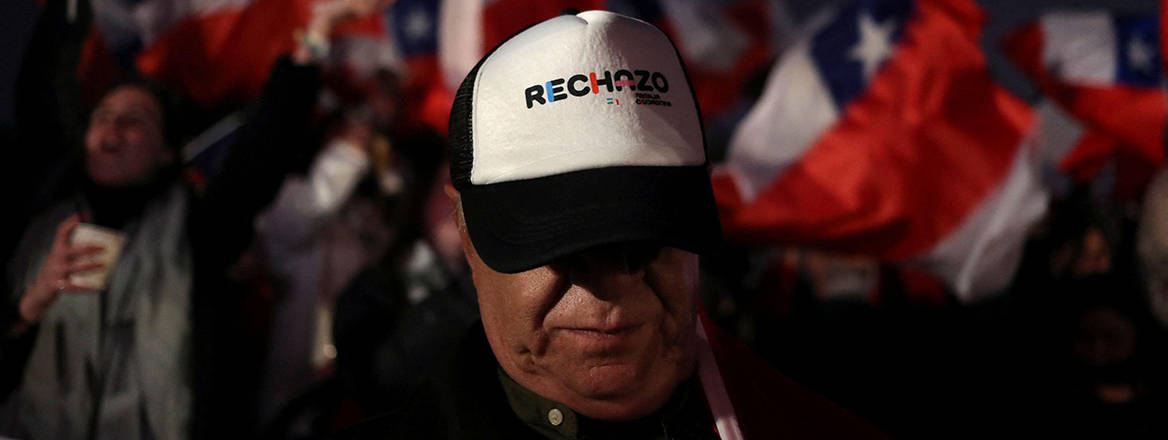Chileans have rejected a radical constitutional proposal, thereby deflating a left-wing tilt. There are lessons in this for all of Latin America.
In a resounding outcome in a referendum last Sunday, the people of Chile let it be known that they prefer political moderation. 62% of voters decided to reject in a plebiscite a draft constitution drawn up by an assembly dominated by the radical and indigenous left, which always militated for the imposition of a disruptive agenda rather than upholding Chile’s institutional traditions by offering a constitutional text that would unite a divided country.
The result is down to many reasons. The first is that the constitutional text itself was bad, a point acknowledged even by the 38% who voted for the approval of the document; most of them claimed that if the new constitution was adopted, it would soon require amendments.
Faulty provisions included the proposed elimination of the Senate and its replacement with a toothless chamber; the granting of autonomy to the regions without being clear about how this would be implemented; the putative legal transformation of Chile’s native peoples into 11 nations with special rights; and the creation of a cascade of unaffordable but constitutionally guaranteed social rights. This plethora of curious provisions ended up alienating even those sectors of Chilean society that in a first plebiscite back in 2021 approved the proposal to start drafting a new constitution by an astonishing 78%.
Last Sunday, both Social Democrats and Christian Democrats – parties with a great deal of experience in running past governments – publicly joined forces to reject the proposed fundamental law, because they understood that what was at stake was the long-term governability of Chile. Without the support of these parties and other popular segments that increasingly resented the fact that symbols as basic as the flag and the national anthem were constantly derided, the proposed new constitution had no hope of passing.
Of course, the government of leftist President Gabriel Boric did its utmost to push the document through. The millennial leftist head of state and his cabinet, in alliance with the Communist Party, argued strongly for the adoption of the new constitution, to the point of making future decisions or reforms conditional on the promulgation of a text that will no longer see the light of day.
Chile's most radical constituents never understood that evolution rather than revolution is the only way to achieve meaningful progress
Burdened by inflation, public insecurity and the continual mistakes of his ministers, Boric tied his falling popularity to an option that was resoundingly rejected, and by a bigger majority than the president had feared.
Towards a New, Inclusive Charter
Yet both Boric and many of those who cast their negative vote over the weekend now admit that the process to replace the 1980 Constitution, originally written under the government of General Augusto Pinochet, is not over. Despite being heavily reformed since 2005, there seems to be a consensus that a new fundamental charter is required, but this time without a Jacobin radical revolutionary spirit behind it.
The Congress and the Senate, but especially the political parties that were marginalised by the independents who dominated the original assembly that drafted the rejected constitution, will then have a key role in seeking a formula where common sense prevails and Chile resumes the path of progress that distinguished it among the countries of Latin America.
It is true that the idea of calling for the drafting of a new constitution was an institutional solution to placate the social uprisings unleashed at the end of 2019. It is also true that there was no shortage of political interests that wanted to overthrow the government of that time. However, the most radical constituents never understood that evolution rather than revolution is the only way to achieve meaningful progress.
The referendum’s result also sends a message to the rest of Latin America, where some see Chile’s Boric as a rising star of the left and Chile itself as a social laboratory.
Now that Chile has taken a fundamental step towards regaining its poise, it is opening the way to building a consensus for a new constitution that is truly a unifying document
The first message is that democracies may appear fragile, but they can also protect themselves if they have free and transparent elections and leaders willing to submit to majority rule.
And the second lesson from Chile is that trying to recreate a country without knowing its institutional history remains a very bad idea, made even worse if there is only will behind this experiment and no experience. The questioning of Chile’s achievements over recent decades has been the constant message of the current generation that believes itself to be morally superior but that, as one minister has admitted, has now tasted defeat.
Now that Chile has taken a fundamental step towards regaining its poise, it is opening the way to building a consensus for a new constitution that is truly a unifying document, where power is structured with limits and freedoms are guaranteed. The time for so-called ‘progressive’ political experiments is over.
Boric will have to try to lead this process while dealing with inflation that could reach 11% by the end of the year, an economy that will expand by only a single percentage point, and crime that is on the rise, particularly crime linked to drug trafficking. For that, he will need support not only from all political parties, but also from a new cabinet staffed by people selected on merit.
The people of Chile have clearly traced this path for him, indicating that political changes must be gradual. Complex democracies are difficult to govern, and as Raymond Aron once said, men do not know the history they write – as proven last Sunday.
The views expressed in this Commentary are the author’s, and do not represent those of RUSI or any other institution.
Have an idea for a Commentary you’d like to write for us? Send a short pitch to commentaries@rusi.org and we’ll get back to you if it fits into our research interests. Full guidelines for contributors can be found here.
WRITTEN BY
Juan Pablo Toro
RUSI Senior Associate Fellow, International Security
- Jim McLeanMedia Relations Manager+44 (0)7917 373 069JimMc@rusi.org


